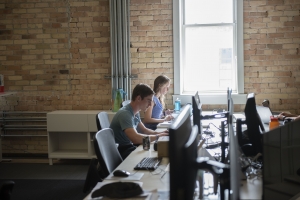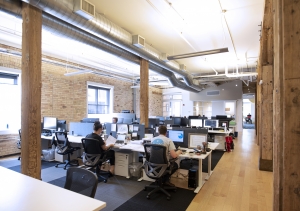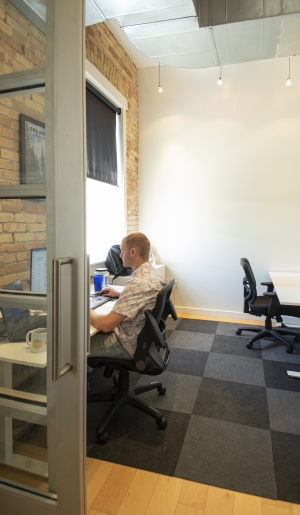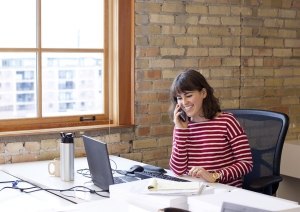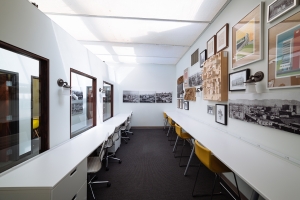How To Be Productive On Fridays
This post is being written on a Friday afternoon.
The millions on millions of us who work Monday through Friday, leaving the office on Friday afternoon is like crossing the finish line at a marathon. Tears might even be shed.
No wonder, then, that worldwide productivity is so low on Fridays: Everyone is counting down the minutes to their weekend.
Unfortunately, though, a lot of bosses are not loosening deadlines just because their employees cannot wait to leave the office.
So how do you stay productive when your mind is already on your couch watching Netflix?
A recent article in The Muse offered a great 4 Step plan to be more productive on Fridays:
- Schedule smaller tasks
- Plan conversations and meetings on Friday
- Plan the following week
- Use the Pomodoro system
Thinking about the weekend = limited concentration on work = prolonged procrastination.
If projects are not chunked into smaller, more manageable tasks, chances are the project will not even be started. Limited attention and prolonged procrastination are further exacerbated when you spend the whole day sitting in your chair staring at the clock. Number 2 in the list addresses this in that, even though many do not want to hold meetings of any importance on Fridays, getting up from your desk and walking around the office or walking with coworkers to talk about certain tasks helps break up the day and increase your body's blood circulation.
Speaking of breaking up the day, the Pomodoro technique is a timing system that breaks up your day into 25 minute increments such that you feel the pressure of time running out and feel compelled to complete much more than you might have left to your own devices. It gives structure to a mind that is wandering freely through the eminent forest of free time.
Speaking of mental structure, planning your next week can be a great way to bridge the productivity gap between Friday and Monday. It is a quite uncommon practice, but it takes minimal time and provides great mental relief come Monday morning when you are back in the office.
Though it is not necessarily a project that you were tasked to complete that Friday, it is still a helpful way for your mind to reflect on what you have completed, what is yet to be completed, and the order in which the subsequent tasks ought to be prioritized, which decreases the amount of time spent on Monday morning getting organized and planning for the day.
It also makes you feel more accomplished and organized as you leave the office on Friday.
What do you think?
How do you stay productive and push through your Friday?
6 Tips for Staying Productive During the Holiday Season
The end of the year can be a hectic time for most of us. Office festivities, get-togethers with family and friends, travel plans, and shopping for your loved ones can take a toll on your productivity at work.
In a Fast Company article, Lisa Evans (the author) looks to Kory Kogon, a global productivity practice leader for Franklin Covey and coauthor. In order to survive the holiday season, Kogon suggests turning your attention inward to focus on what you need to be successful rather than giving into the demands of the holiday season’s demands.
Below are Kogon’s six tips, in the words of Evans, to staying productive during this busy time:
Be Intentional
“Staying focused in the midst of the hectic holiday season can seem a daunting task, which is why Kogon recommends implementing the 30-10 promise. ‘Before the week starts, find 30 minutes to think about the things that need to get done in the coming week and prioritize that list,’ she says.
Schedule the most important items in your calendar, allowing the smaller tasks to fill in around them. Then, at the end of each workday, reconcile your calendar. ‘If something didn’t get done, move it to another place; reschedule it,’ says Kogon. Having a plan means you’ll be less likely to fall off track by seasonal distractions.”
Take A Break
“The holiday season is a great time of year to take a break. ‘Research shows that taking even a 10-minute break during the day increases productivity,’ says Kogon. Take advantage of the seasonal slowdown to give your brain a much-needed rest. You’ll return to work more energized and ready to be productive in the new year.”
Take A Personal Day for Errands
“Between get-togethers with family and friends and holiday shopping, you no doubt find your personal calendar encroaching on your work life during the holiday season. Rather than trying to cram personal errands into your workday, schedule a personal day to focus solely on those domestic and personal holiday preparations. This will allow you to focus 100% of your energy on work while you’re there.”
Don’t Be Afraid to Say No
“Is your holiday calendar jam-packed with invites to festive networking events? While you may be tempted to attend them all, Kogon says this can cause unnecessary stress and hinder your productivity.
The key to managing holiday invites is being intentional. Clarify what’s most important for you at the moment. For every invitation you receive, ask whether that event is going to help you to achieve that goal. Accepting an invitation because you don’t want to hurt someone’s feelings can have you burning the candle at both ends and falling behind in meeting your goals.”
Avoid Procrastination
“During the rest of the year, you may find you get an adrenaline rush from pushing deadlines, but Kogon says maintaining this mindset during the holiday season is dangerous. There’s a good reason many of us perform at our best while under pressure.
‘Procrastinating gives us a rush of dopamine–the body’s feel-good chemical,’ says Kogon. But during the holiday season, too many distractions and crises may come up, causing your stress levels to be elevated to an unnaturally high level. This can make the holiday season truly unbearable.”
Set Expectations
“Be realistic with yourself and others about how much you will be able to do, when you will be available, and when others can anticipate a response from you.
If you normally respond to emails promptly but are facing a particularly taxing day, you may want to set up an email notice to alert others that you may take a little while longer than normal to respond. This not only helps others know what to expect of you, but helps to ease your anxiety over a cluttered inbox.”
Stressed? Here Are 12 Productivity Tips to Help Reduce Stress
No matter the industry or stage in your career, stress is inevitable. If you allow that stress to perpetuate, it will eventually hinder your productivity.
In a Forbes article, written by the Forbes Coaches Council, the Council created 12 tips on how to manage stress while staying productive.
Pause, Process, Proceed
Grace Totoro, a career transitions coach, states:
“Set aside time in your day to handle phone calls, texts and email. If necessary, use auto-reply and voicemail In between work on the functional aspects of your role. When stressed, apply this strategy: Pause, breathe and ask yourself, ‘What is happening now to generate these feelings?’ Process possible solutions to pull yourself together, then proceed with what needs to be done.”
Do The Hardest Things First
John M. O’Connor, the President and CEO of CareerPro, suggests leaving the smaller tasks towards the end of your day or week.
“… It helps to tackle a portion of a harder project before doing the more common work that needs to be done. When you put off a larger project like a talk, a written piece or a looming project deadline, it weighs on you and makes you less productive on the more normal, basic, but still important tasks.”
Make a List
“The best solution for being productive and alleviating stress is to make a list of things that need to be completed each day. If it is a big project, be sure to break the deliverables down into manageable pieces. It also might make sense to complete a few of the easy things early to feel more accomplished. Another solution is to keep a calendar and backfill the tasks from today until the project is actually due, filling in a timeline of when each step should be completed so that the final piece is completed on-time. Remember is always best to underpromise and overdeliver.” – Kathleen Houlihan, the Founder and CEO of Dream2Career
Turn Off Alerts
Trellish Usher of the T.R. Ellish Group, suggests:
“One of the best productivity tips I recommend and implement, which also reduces stress, is to turn off the notifications on your mobile phone for at least two hours during the workday. …”
Pick Three Essential Things
MJ Impastato, of H2H Systems, suggests reading Essentialismby Greg McKeown.
“… Pick three essential things you must get done that day and focus your energy there. You’ll soon realize your long list of to-dos get done much quicker and with more efficiency. Say goodbye to overwhelm.”
Plan Your Day Around Your Productive Times
Kyle Elliott, of Kyle Elliott Consulting, recommends:
“… Regardless of what your schedule looks like, you need to own it and plan your day to accommodate your energy levels. For the times of day when you are most productive, schedule your most important meetings and projects. Then, for your less productive times, focus on administrative tasks that need to be tended to but require less brain power.”
Spend An Hour On Each Project
“…set a timer and work on it for an hour. Turn off all distractions. Then, take a break and transition to another project. Set that same timer for 60 minutes and take another break.” – Meghan Godorov, of Meghan Godorov Consulting.
Set People Up For Success
Gordon Tredgold of Leadership Principles LLC, suggests:
“If you want people to be productive, set them up for success. People are not afraid of hard work; they are afraid of failure. If they can't see how they will succeed, productivity will go out of the window. A simple approach is to ask them if they have everything they need to be successful. Just asking this question helps. If they say yes, they have taken ownership; if they say no, give them what they need. Having everything you need to be successful is a great way of relieving stress and increasing productivity.”
Put It On Your Calendar
Jane Zaretsky, a corporate trainer and business coach, recommends:
“Your calendar should be the guiding force in your work. If you have everything, including personal time, in your calendar, you use your calendar to tell you what you should be doing and when you should be doing it, and manage that with integrity, you will not stress. …”
Give Your Employees More Autonomy
“To increase productivity and reduce stress, give employees a flexible schedule. As long as employees do their work, they should be given autonomy. People are more productive and out sick less often when they feel trusted and respected.” – Beth Kuhel, Get Hired LLC
Manage Your Internet Time
“By nature, humans are curious. And the internet is the biggest curiosity out there. I employ software on my PC that tracks the sites I go to, and then I can determine a website as distracting, productive or neutral. I then set a limit for 15 minutes maximum of distracting site access over a 9:00 a.m. to 6:00 p.m. period. … It regulates me; it's my own censor. Freeing up time that I would burn through otherwise allows me to get tasks done and reduce the overall stress and anxiety of work.” – Tyron Giuliani, Selling Made Social
Align With Your Values
“Make sure an activity you do is aligned with your top five values or priorities. If it's not, ask yourself why you are doing it. Maybe you'll still do it, but it needs to be modified to honor your values. When your activities are aligned with your values, you can feel assured that you're going to achieve your deepest desires. Then, put time on your calendar for each activity to confirm they will get done.” – Rosie Guagliardo, InnerBrilliance Coaching
How To Be Productive On Fridays
This post is being written on a Friday afternoon.
No particular reason why, just how it fell into the schedule.
The millions on millions of us who work Monday through Friday, leaving the office on Friday afternoon is like crossing the finish line at a marathon. Tears might even be shed.
It is relief, it is freedom. It is like breaking out of a cage.
No wonder, then, that worldwide productivity is so low on Fridays: Everyone is counting down the minutes to their liberation.
Unfortunately, though, a lot of bosses are not loosening deadlines just because their employees cannot wait to leave the office.
So how do you stay productive when your mind is already on your couch watching Netflix?
A recent article in The Muse offered a great 4 Step plan to be more productive on Fridays:
- Schedule smaller tasks
- Plan conversations and meetings on Friday
- Plan the following week
- Use the Pomodoro system
Thinking about the weekend = limited concentration on work = prolonged procrastination.
If projects are not chunked into smaller, more manageable tasks, chances are the project will not even be started. Limited attention and prolonged procrastination are further exacerbated when you spend the whole day sitting in your chair staring at the clock. Number 2 in the list addresses this in that, even though many do not want to hold meetings of any importance on Fridays, getting up from your desk and walking around the office or walking with coworkers to talk about certain tasks helps break up the day and increase your body's blood circulation.
Speaking of breaking up the day, the Pomodoro technique is a timing system that breaks up your day into 25 minute increments such that you feel the pressure of time running out and feel compelled to complete much more than you might have left to your own devices. It gives structure to a mind that is wandering freely through the eminent forest of free time.
Speaking of mental structure, planning your next week can be a great way to bridge the productivity gap between Friday and Monday. It is a quite uncommon practice, but it takes minimal time and provides great mental relief come Monday morning when you feel trapped back in a cage.
Though it is not necessarily a project that you were tasked to complete that Friday, it is still a helpful way for your mind to reflect on what you have completed, what is yet to be completed, and the order in which the subsequent tasks ought to be prioritized, which decreases the amount of time spent on Monday morning getting organized and planning for the day.
It also makes you feel more accomplished and organized as you leave the office on Friday.
What do you think?
How do you stay productive and push through your Friday?
How To Take Breaks That Boost Your Productivity
As corporate structures and office layouts become less compartmentalized, the demand for working long hours in order to get all of the work done still remains high.
Many companies have created comprehensive wellness programs in their offices that include fitness classes, nap pods, relaxation rooms, social events, and a range of food options.
As great as these amenities are for employees' mental and physical health, deadlines still have to be met.
Anyone who was a kid in the 90s knows how something fun like video games or running around outside or staying in bed always trumped productivity toward anything else, so how can we as adults make sure that our breaks are long enough to be healthy but short enough to get our work done?
As with most things in life, it's a matter of balance that depends on the type of break that best suits your personality.
Aytekin Tank, the founder of JotForm, wrote an article on the different kinds of breaks you can take to be most productive at your specific workplace. His article points out that the success of a break is measured by whether or not someone is able to turn off their brain's prefrontal cortex, which is responsible for the majority of complex decision making and stimulus organization.
Here is Tank's list of breaks to choose from:
- Daydream
- Move your body, either by walking around the office or taking a fitness class
- Stand at your office's "water cooler"/kitchen and socialize with a colleague
- Get outside and see nature
- Eat a little snack
- Browse the internet
- Learn something new
These run the gamut of required physical and mental attention from which you can choose based on your needs, but the common thread among them is the simple act of distraction.
Distracting your brain via a short funny YouTube video, sitting back in your chair with your eyes closed, or catching a CrossFit class all divert energy away from your prefrontal cortex and on to something temporarily novel.
The novelty allows the brain to free-float and relax, if only for a couple of minutes.
Furthermore, every option presents the opportunity for physical movement, which complements the mental distraction by allowing increased blood flow to awaken not only your body but your brain in different ways than it has just been operating.
Though Work Hive is full of members who buckle down and focus on their work super hard all day long, everyone gets up from their desk at some point.
What kind of break works best for you? How can you schedule it/them into your workday so that you are most productive?
As coworking spaces have become all the rage in recent years almost regardless of the improving job market and overall economy, the most common commentary about being a member at one is the possibility of community, connection, and collaboration.
It makes sense that being around strangers all day long and sharing a kitchen and bottomless coffee before some kind of networking event begins will encourage socializing, but something still needs to actually inspire that drive to connect.
In 2012 an article was posted on Geekpreneur about the first introduction of coworking spaces and why they were becoming successful.
The article mentions the power of the studio's noise level. There is a certain kind and volume of noise that is optimum for people to be productive and subsequently motivated to engage with others around them.
The author writes: "A good co-working office will have the buzz of a workspace rather than the relaxed atmosphere of a home or the multiple distractions of a corner table in a café. When you’re surrounded by other freelancers who have their heads down and are focused on a project, peer pressure forces you to do the same."
Much like a college library, a certain level of buzzing noise that indicates people talking, rustling papers, or tapping on computer keyboards creates the office environment full of productivity and focus without forcing you to be in a cubicle jungle watching the clock.
The article goes on to argue that working with your headphones in may not always be the most productive method because it cuts you off from the aforementioned noise, relies heavily on your choice of music, and cuts you off from socializing and connecting with your peers around you.
Of course, we are not suggesting that you socialize all day long and open yourself to be interrupted and distracted every day, but letting the noise of the people around and then making sure to get up, walk around, and say hello to someone, however briefly, will have a tremendous impact on your productivity and potentially the future of your career.
How To Create Your Perfect Productivity Schedule
Has anyone ever told you to have a chock-full morning routine in order to "face the day" and maximize your productivity?
We all have. But it can't be effective for everybody. People work differently and certainly feel differently in the morning.
Some people exercise and make a breakfast and read the newspaper (or the news on their iPad) and french press their coffee all before heading to work, while many others get out of bed and walk out the door and find productivity at other times of day.
Aytekin Tank, founder of JotForm, discusses how you can map out your energy levels throughout the day in order to determine when you are most productive.
Structure
Once you know your patterns, you can begin to schedule your day around that. Tank explains that those in the design and coding industries, for example, plan out their work days very differently than those in finance, teaching, or management.
The types of meetings they schedule are as different as the specific work that they focus on for hours on end in a flow state.
What type of productive time frames does your specific job demand?
What time of day is best to schedule those time frames for you?
Discipline
Once you begin to create a schedule of when you are most productive, you must make it a habit.
Many online calendars have features that allow you to schedule something that day and way every week automatically so that it is out of your hands and allows coworkers to see that you are not to be disturbed during that time period.
Furthermore, decide how your work schedule affects the rest of the day. Knowing when you like to exercise will dictate when you start your workday. Committing yourself to unplugging and relaxing your mind on the weekends will dictate the way you commit to your productive time frames during the workday.
As has been mentioned in a previous post, the new modern structure of offices and work schedules has offered flexibility to employees to employ their personal health habits however is most effective for them and in the most productive times of day.
Start with your own personal map:
- What time of day do you like to exercise?
- What time of day do you feel the most productive?
- What kind of work do you feel the most productive working on?
- What time of day do you wish to make sure you leave the office?
How To Choose A Simple Ritual That Will Keep You Focused And Boost Your Productivity
Productivity is 99% mental. We all are different people working on very different things and so we all have unique ways that we can be productive. In this climate of freelancers and remote employment, productivity is more and more dependent on self-motivation to be successful because so many people are working alone at home or in a coworking space like Work Hive.
Regardless of whether someone has a designated desk in a coworking space or their own private office, little things to get them into the right work mindset can range from making sure the desk is tidy to doing some kind of physical movement that is only performed before beginning work.
August Birch, a crime thriller novelist, has a small figurine of Buddha on his desk which he lays flat down when he is not writing and then stands back upright when it is time to write. Not only is it is a symbolic on/off switch for his productivity, but its power resides in his distaste f or disorder, so making sure that Buddha is sitting up no longer distracts him and means that he is able to focus.
or disorder, so making sure that Buddha is sitting up no longer distracts him and means that he is able to focus.
To him, it is a factor of externalizing the responsibility and taking the pressure off of his willpower. He writes "The object or ritual doesn’t matter. The importance lies in taking the behavior away from the weak force of willpower. When we build a habit attached to a simple object outside ourselves, there’s no more willpower. We’re punching the clock at the gas station. It’s time to get to work." It is a tangible marker that we need to focus, like when the clock strikes a certain time to mark the beginning of an exam."
What do you do to get focused and remain productive?
Is there a small object that you can use like Birch does?
Or do you need to make some kind of movement or listen to some kind of song to get into the flow?
Holiday Survival Guide: How To Stay Productive Amidst The Holiday Cheer
Holidays are great and all, but the holiday splendor can be exhausting. Especially going from Halloween to Thanksgiving to Christmas / New Year's in three consecutive months.
It all becomes a big blur of candy wrappers, Christmas music, and overeating in front of family members.
The holidays can be quite challenging, however, when you remember that you are an adult and still have a job you must work while Mariah Carey's All I Want For Christmas is playing on repeat around you.
When the holidays are all over the tv, social media, and Starbucks cups, it is hard to stay focused at the office. Luckily, a Forbes article offers some suggestions:
- Make a plan
- Take time off
- Don't multitask
- Exercise
- Collaborate
- Actually do the work...
Obviously the work still has to get done, so it is a matter of mentally saying "Let's keep working" while your brain is already focused on a Tryptophan-soaked nap.
The thing about multitasking is: there is no such thing as multitasking.
A much longer conversation could be had about this but for this subject it suffices to say that trying to multitask while your brain is already distracted can do more harm than good during the holidays. The article states:
"Instead of getting many jobs done at once, people actually just slow themselves down by trying to divide their attention. When you multitask, you're also a lot more likely to make mistakes, which means more wasted time when you have to fix issues later."
Your mind is already divided by family needs, vacation plans, and then work, so why divide the attention even further?
Focus on one task at a time in order to make sure it is completely finished and you can forget about it before moving on to the next one.
The suggestion to take time off does not encourage you to add more days to your holiday vacation but instead intentionally plan certain days to take off in order to run the errands and do the shopping that you have not done yet and have a hard time getting out to do in the evenings after work.
That way, you have a plan and you no longer have to stress about when you are going to be able to buy that sauce or those gifts.
Speaking of a plan, by far the most important suggestion on the list is to make a plan for yourself during the holidays. Everyone's work, work style, family demands, and holiday traditions are different, so think about your own unique needs in preparation of the holiday based on your work demands.
What tasks can you predict will be most difficult to complete?
What tasks involve other people?
Schedule your weeks out in such a way that all things, including shopping and family time, are factored in with your work schedule.
Lastly, do not feel alone in this. Ask your colleagues how they are getting themselves through the holiday distractions, and look for opportunities to collaborate so that the members of your collective team or department does not feel stuck in a lot of individual experiences of stress.
After all, "your co-workers are going through the exact same issues you are with the holiday season, so don't go it alone - have team meetings where you figure out how you can all work together to make the end of the year run smoothly."
Ironically, many people feel alone during the holidays under the many pressures on them from work, finances, travel, spouses, and family.
Ask yourself what your own needs are this holiday season and honor those so that neither your productivity nor your much needed time off is sacrificed.
How Smartphones Damage Your Productivity...And What To Do About It
How many of you have your phone out on your desk right now?
Yup, caught you.
We are all guilty of it. Even if you are an Apple customer who has their laptop out all day long and linked to their cell phone, you probably still have your phone within arms reach at all times. God forbid you go to the bathroom and forget to bring it with you.
But why is it there, really? How is it serving you while you work on actual work-related projects on your computer?
Even though smartphones can improve productivity in a lot of ways (GPS, educational apps, communication apps, etc.), they are more often than not detrimental to our productivity.
Everyone's workdays are spent so differently all over the world that your phone could light up with a notification at any time of day from a million different sources.
Darius Foroux, an entrepreneur and blogger who focuses his work on exploring how we can live meaningful and productive lives, wrote a great post in which he explains that
"Smartphones are dangerous not only because they may cause stress, anxiety, and even depression, but because they change your behavior. People who make phones and apps are smarter than us and their only goal is to get you hooked."
This is how people - especially young people - form legitimate addictions to their phones and cannot imagine spending any down time doing anything but looking at the screen doing......something.....on it.
A few years ago, our community manager, Taylor, found himself spending forty-five minute to an hour at a time aimlessly scrolling or tapping through apps on his phone. But not doing anything. He says
"I felt like a zombie when I snapped out of it. I wasn't doing a single thing that was productive or meaningful. Just staring at whatever was on the screen. It wasn't healthy. But it taught me that I desperately needed something to help my brain zone out after a long day."
The owner of Work Hive, Mark, who owns multiple businesses himself, enjoys having an Apple watch on his wrist because "it lets me know when something needs my attention or needs to get done, but I can chose when to get back to that task" He goes on to state "Technology is not pure good or pure evil. It is as distracting as you let it be."
Along those same lines, Foroux made changes in his own relationship to his phone from which everyone can learn. He wrote that he:
- turned off ALL notifications except messages and calls
- removed himself from all extraneous Whatsapp groups
- removed all news apps
- only consumes music, paid journalism, articles from specific authors he follows, podcasts, YouTube videos, books, and audiobooks
- uses his phone to call, text, and to take notes, photos and videos
Finally, and maybe most importantly, he "stopped immediately responding to notifications" when they come in. This is the most important consideration because this is the productivity trap: the perceived urgency that everything must be responded to and looked at in that exact moment.
Every person everywhere has so much stimuli flashing at them every second of the day, it's no wonder that productivity declines if your eyes are darting from one thing to another, demanding that our cognitive attention follows and that our thoughts shift to whatever the new subject is.
How does your phone affect your life? Does it distract you during the workday? Do you feel that it affects your productivity in a positive or a negative way?

